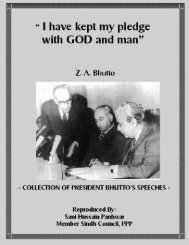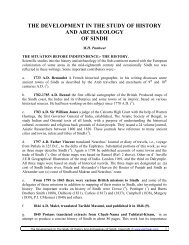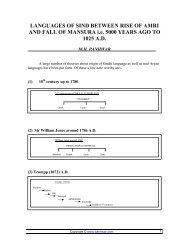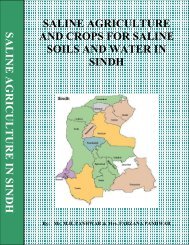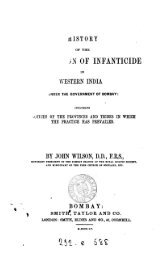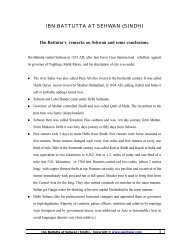Memoir on Thar and
Memoir on Thar and
Memoir on Thar and
Create successful ePaper yourself
Turn your PDF publications into a flip-book with our unique Google optimized e-Paper software.
1852-53, together with the value <strong>and</strong> quantity of the larger items of merch<strong>and</strong>ise crossing<br />
the fr<strong>on</strong>tier, <strong>and</strong> the aggregate value of the less important <strong>on</strong>es, to show the total amount<br />
of goods exported <strong>and</strong> imported in <strong>on</strong>e year.<br />
123. The Thurr c<strong>on</strong>tains a salt lake, capable of exporting large quantities of self-produced<br />
salt of good quality. In 1844-45, 21,074 Indian maunds of this article were exported from<br />
the Mokye Salt Lake, such being its name; while in the following seas<strong>on</strong>, up to the date<br />
of its being closed, i. e. from 1st May 1845 to 16th March 1846, 60,928 Indian maunds<br />
were exported. The duty levied <strong>on</strong> it, however, was trifling, being at the rate of Rs. 25¾<br />
per 100 bullock loads, or about two annas per Indian maund. Subsequently, the<br />
Marwarrees, who were the exporters, offered to pay <strong>on</strong>e Ukosy Rupee per bullock load,<br />
or about seven annas per Indian maund, if allowed to export it. Their offer was refused,<br />
<strong>on</strong> the grounds that the export of salt from the Thurr, at such a small rate of duty, would<br />
interfere with the general revenue derived from the salt m<strong>on</strong>opoly.<br />
124. There is no doubt that the revenue derivable from the Mokye Salt Lake, if worked at<br />
the rate proposed by the Marwarrees, would be c<strong>on</strong>siderable * , even allowing for a greatly<br />
decreased export, as compared with 1845-46, above alluded to, c<strong>on</strong>sequent <strong>on</strong> the<br />
increased duty. Under these circumstances, as it suits our policy to prohibit the working<br />
of the Mokye Salt Lakewith the vie wof protecting the general revenue derived from the<br />
m<strong>on</strong>opoly of that article, it would appear but fair to give the Thurr <strong>and</strong> Parkur<br />
Collectorate credit for an amount of revenue that it is capable of yielding, but which we<br />
keep in abeyance.<br />
125. The Commissi<strong>on</strong>er in Sind, in a report to<br />
Government noted m the margin, makes the<br />
following observati<strong>on</strong>s <strong>on</strong> this subject:—<br />
Report of Thurr <strong>and</strong> Parkur, to the Right<br />
H<strong>on</strong>orable the Governor, No. 48C. of<br />
1856, dated 21 st January<br />
“From the enquiries I have made <strong>on</strong> the spot, I am c<strong>on</strong>vinced that Col<strong>on</strong>el<br />
Roberts <strong>and</strong> Lieutenant Raikes are right in supposing that the Mokye salt might<br />
be allowed export at a reduced scale of excise, so graduated as not in any way to<br />
interfere with the salt of our own pans at Patree or Jo<strong>on</strong>jawarra, <strong>and</strong> that a<br />
c<strong>on</strong>siderable revenue might thus be realized. The <strong>on</strong>ly parties really benefitted by<br />
* C<strong>on</strong>sequent <strong>on</strong> the salt m<strong>on</strong>opoly, it is difficult to ascertain what value should be attached to the Mokye Salt Lake as<br />
a source capable of yielding revenue; whence the cause of its being spoken of as “c<strong>on</strong>siderable.” The m<strong>on</strong>opoly gives a<br />
fictitious value to the article in this as in all similar cases; <strong>and</strong> it may therefore be argued that <strong>on</strong>ly the amount of<br />
revenue derived therefrom, supposing the m<strong>on</strong>opoly to have ceased, <strong>and</strong> the salt of the Thurr to be brought into<br />
unrestricted competiti<strong>on</strong> with the salt produced elsewhere, can be c<strong>on</strong>sidered as the value of this source of revenue. On<br />
the other h<strong>and</strong>, large quantities of salt were formerly exported from the Thurr, yielding a c<strong>on</strong>siderable revenue; now the<br />
export is prohibited, with the view of protecting <strong>and</strong> increasing the dem<strong>and</strong> at our other salt works. The increase<br />
therefore of revenue, c<strong>on</strong>sequent <strong>on</strong> an increased dem<strong>and</strong>, if there be any, should at any rate partially be attributed to<br />
the closing of the Thurr salt lake, <strong>and</strong> a liberal credit allowed to the Thurr for having thus benefitted indirectly the<br />
general revenue from the salt m<strong>on</strong>opoly. If, however, there is not an increased dem<strong>and</strong> at our salt works, c<strong>on</strong>sequent <strong>on</strong><br />
the closing of the Thurr salt, it becomes a questi<strong>on</strong> how far the working of the Thurr salt lake would affect our other<br />
works. All that I wish to maintain is, that the closing of the Mokye Salt Lake either benefits the general revenue derived<br />
from the salt m<strong>on</strong>opoly, or it does not: in the former case, the Thurr <strong>and</strong> Parkur Collectorate appears entitled to credit<br />
<strong>on</strong> this account; in the latter, the natural inference is that the working of the Thurr salt lake would not interfere with our<br />
salt works generally, <strong>and</strong> go far to make up the deficit in the Thurr <strong>and</strong> Parkur revenue.<br />
<str<strong>on</strong>g>Memoir</str<strong>on</strong>g> <strong>on</strong> the Thurr <strong>and</strong> Parkur Districts of Sind. Copyright © www.panhwar.com<br />
44




